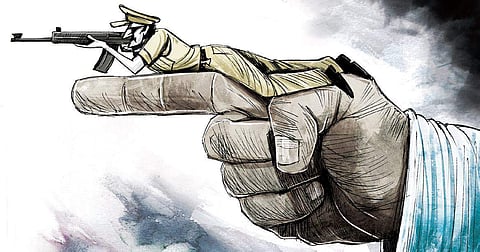

When the seniormost law officer of the government expresses anguish in open court at the lawlessness in the country, what should citizens infer?
Last week, the Supreme Court heard Attorney General K K Venugopal refer to Kanwariyas in Delhi vandalising a car after it brushed against them and Marathas in Maharashtra attacking factories during their agitation for reservations. The police did nothing in either case, he said. It would be difficult to stop these incidents unless responsibility was fixed on a senior police officer, say the district’s superintendent of police, whom the courts could haul up for inaction, the A-G suggested.
This is a sure-fire solution, because it will end the impunity with which our policemen function. This impunity is one of the major reasons for the common citizen’s feeling of defencelessness in the face of mob violence. We know from bitter experience that the cops won’t act when mobs run amok. Judicial commissions have invariably indicted the police for their failure— a better word would be refusal—to take necessary action against rioters. Had police officers who abdicated their responsibility been punished, if not in courts, then at least by strict departmental action—not in the form of transfers but inquiries, demotions and stoppage of increments—we wouldn’t have reached a stage where the A-G has to express despair at the phenomenon of uncontrolled mob violence.
But who will fix responsibility on the local officer? His ultimate boss, the state’s police chief? That should have been the norm anyway—when a situation goes out of control anywhere, the person in charge seeks to find out why and fixes blame so that it doesn’t happen again. But this common-sense principle has never been used by those who head our police forces. The obvious reason is that their bosses, the home minister and chief minister, have never held them responsible for their inaction during riots.
Innocents are killed by mobs only because of their religion or caste; shopkeepers have their stores vandalised and commuters are stoned at random by agitators. But no one who had the power to prevent and stop the mayhem is punished. Rioters are arrested, but more often than not let off because the police don’t care to build a substantial case against them. Why take the trouble to investigate when none of their seniors is losing sleep over rioters being acquitted?
Indeed, one could go so far as to assert—given the pattern seen in riot after riot—that when rioters belong to any of the following categories: the ruling party, a Hindutva organisation or a dominant caste (and the victim belongs to a ‘lower’ caste or the violence is part of a caste agitation), the police rarely arrest them. When they must, they make sure the case against them is so lax that the court has to acquit these accused. In Maharashtra, one more category qualifies for this special treatment: those who belong to the Raj Thackeray-led Maharashtra Navnirman Sena, a party not known for peace-ful agitations.
Indulgence towards rioters of the ruling party is understandable. But police indulgence towards dominant castes, Hindutva organisations and Raj Thackeray’s followers can be ascribed to two factors. The first is that the latter groups enjoy the ruling party’s favour.
The Delhi police, who neither fired in the air nor swung a lathi at the Kanwariyas smashing a car, may not have seen Uttar Pradesh’s top police and civil officers showering petals on these pilgrims from a helicopter. But they must have known of the UP CM’s special interest in them. Last year, he ordered the trimming of ‘inauspicious’ fig trees that fell on their route. This year, the UP police ensured only vegetarian food was served by dhabas wherever the Kanwariyas passed.
The second reason for such indulgence towards these special categories is what judicial commissions have conclusively established: the police themselves share their world view, be it contempt for ‘lower’ castes, or hostility towards non-Hindus. That is why they seem to find nothing wrong in the actions of these rioters. If the police themselves tell Muslims: “You circumcised fellows, go to Pakistan”, as was reported in the proceedings of the Srikrishna Commission inquiring into Mumbai’s 92-93 riots (and has been reported in many riots elsewhere), how are they likely to act against those who shout the same slogan and follow it up with physical violence?
Today, it’s not just Shiv Sainiks or Bajrang Dal rioters who are saying this. A survey by a TV channel brought up 124 instances of hate speech by 45 politicians since this government took over—35 of them were from the BJP. These politicians are the police’s ultimate masters.
There’s one more reason the police wink at certain categories of rioters. They know their political masters will not only overlook their criminal dereliction of duty, but will actually protect them if citizens initiate action against them. In Mumbai, policemen indicted for crimes ranging from murder of innocent Muslims to shielding rioters in the 92-93 riots, were protected from prosecution by the government. And this wasn’t a Hindutva government.The lives of ordinary citizens matter less to our governments than does the goodwill of ‘upper’ caste and Hindutva organisations, and last but not the least, the morale of the police. That’s the reality we have to keep in mind.